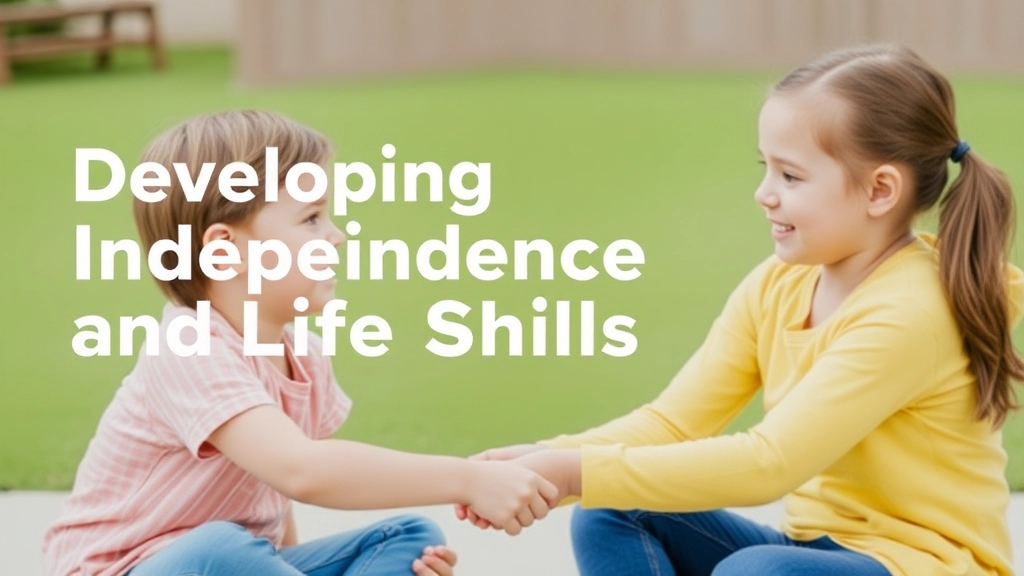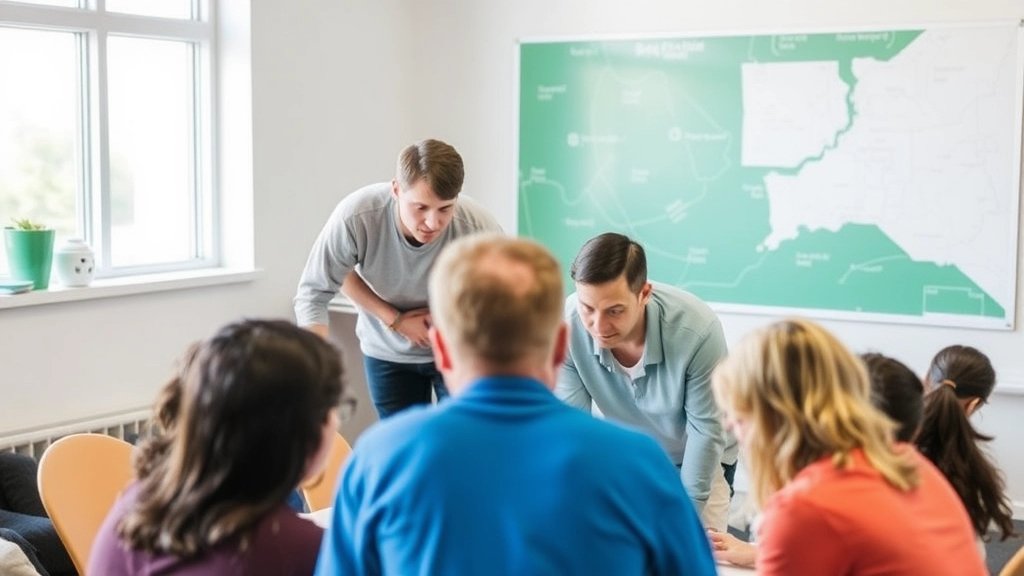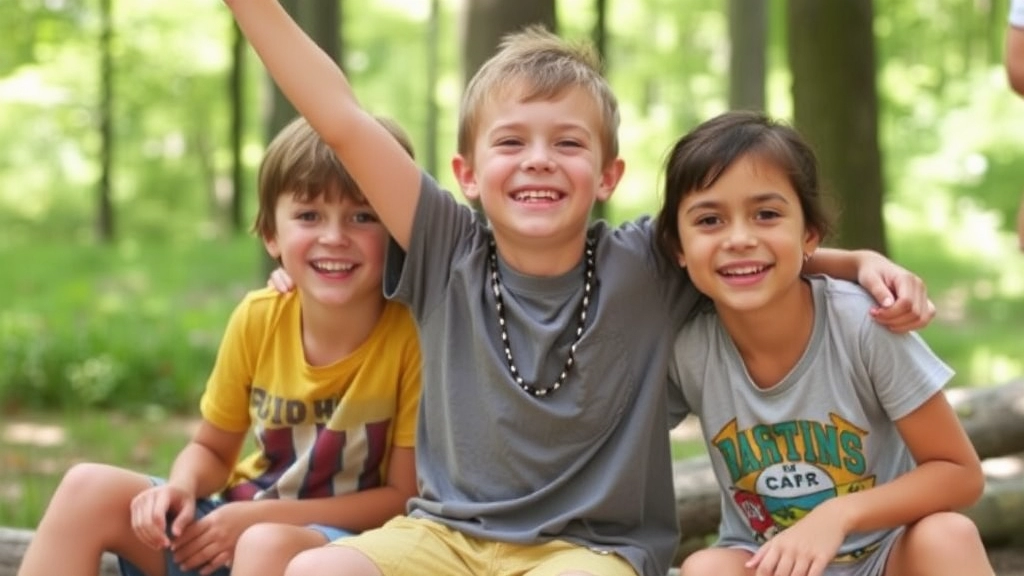Summer Camp: A Transformative Experience
Summer camp is more than just a seasonal getaway; it’s a transformative experience that cultivates essential life skills and fosters emotional well-being. The purpose of having fun at summer camp goes beyond mere entertainment. It’s about building confidence, enhancing physical health through outdoor activities, and developing independence and life skills. Through engaging in new adventures and challenges, kids learn to unplug from technology and connect with nature, promoting emotional resilience and creating lifelong memories and friendships.
The Benefits of Summer Camp
From encouraging creativity and imagination to learning teamwork and leadership skills, summer camp provides a unique environment where children can thrive. They gain invaluable social interaction, boosting their empathy, communication skills, and social confidence.
Personal Growth and Development
By stepping out of their comfort zones, kids discover their capabilities and return home with a renewed sense of self. Dive into our comprehensive guide to understand why summer camp is a life-changing experience that equips kids with skills they’ll carry into adulthood.
Benefits of Social Interaction at Summer Camp
Ever wondered why summer camps are such a big deal? Let’s dive into the benefits of social interaction at summer camp. Picture this: You’ve got kids glued to their screens, missing out on real-world connections. It’s a problem, right? Well, summer camps are the antidote.
Real Connections, Real Growth
At camp, kids are thrown into a melting pot of personalities. They meet peers from different backgrounds, which is huge for social development. It’s not just about making friends; it’s about learning to understand and respect diversity.
- Communication Skills: Kids learn to express themselves better. They have to talk to new people, share stories, and even resolve conflicts.
- Empathy: Being around others in a new environment teaches empathy. They see life from different perspectives and learn to be more understanding.
- Social Confidence: Interacting with a bunch of new faces boosts their confidence. They learn to introduce themselves, join group activities, and even lead conversations.
Stories from the Campfire
I remember a kid named Jack, who was super shy. First day at camp, he barely spoke. By the end of the week, he was leading a group in a scavenger hunt. The transformation was incredible. This isn’t a one-off; it’s a common story at camps.
Skills That Stick
The social skills kids pick up at camp aren’t just for the summer. They carry these skills back to school and beyond. They become better team players, more confident speakers, and even future leaders.
- Teamwork: Camps are all about group activities. Whether it’s a game, a project, or a campfire song, teamwork is key.
- Problem-Solving: Kids often face challenges that require collective brainstorming. They learn to solve problems together, which is a crucial life skill.
- Leadership: Older kids or returning campers often take on leadership roles, guiding newbies and organising activities.
The Digital Detox
One of the biggest perks? Kids unplug from technology. No screens, just face-to-face interaction. This digital detox is essential for developing real social skills. They learn to read body language, pick up on social cues, and engage in meaningful conversations.
Lifelong Impact
The friendships made at camp often last a lifetime. These are not just summer buddies; they’re friends who share unique experiences and adventures. The bonds formed are strong because they’re built on shared memories and mutual growth.
So, if you’re on the fence about sending your kid to camp, think about the benefits of social interaction at summer camp. It’s not just a fun getaway; it’s a life-changing experience that equips kids with essential social skills. For more insights, check out our guide on top sleepaway camps or explore the culture and traditions of summer camps.
Developing Independence and Life Skills

Ever wondered how your kid can become more independent?
Or maybe you’re worried they’re not learning the essential life skills they need?
Let’s dive into why summer camp is the perfect solution.
Why Independence Matters
Independence is key for kids. It’s what helps them grow into confident adults.
At summer camp, they’re away from home. They have to make decisions on their own.
No parents to lean on.
Just them, their peers, and the camp staff.
Real-Life Skills in Action
Now, let’s talk about life skills.
These are the practical skills your child needs to navigate the world.
At camp, they learn:
- Time management: Balancing activities and free time.
- Problem-solving: Figuring out how to set up a tent or cook a meal.
- Responsibility: Taking care of their belongings and completing chores.
Stories from Camp
Imagine your child coming home and telling you they built a fire from scratch.
Or that they helped a friend who was feeling homesick.
These are the moments when they learn self-reliance and empathy.
Building Confidence
When kids achieve something on their own, their confidence skyrockets.
They realise they can handle challenges.
They become more resilient.
Practical Tips for Parents
Want to help your child prepare for camp? Here are a few tips:
- Encourage small responsibilities at home: Let them pack their own bag.
- Talk about camp experiences: Share stories or watch videos together.
- Practice decision-making: Ask them to choose activities or plan a day out.
Enhancing Physical Health Through Outdoor Activities
Worried your kids are spending too much time indoors? Are you concerned about their physical health and wondering how to get them moving? I get it. With screens everywhere, it’s tough to pull anyone away from their devices. But here’s the thing: summer camp might just be the perfect solution.
Why Outdoor Activities Matter
Outdoor activities are more than just a way to pass the timeâthey’re crucial for enhancing physical health. At summer camp, kids are constantly on the go, engaging in a variety of activities that keep them active and fit.
Here’s why outdoor activities at summer camp are a game-changer:
- Cardiovascular Health: Running, hiking, and swimming get the heart pumping, improving cardiovascular health.
- Strength and Endurance: Climbing, canoeing, and other physically demanding activities build muscle strength and endurance.
- Flexibility and Coordination: Sports like soccer, basketball, and obstacle courses enhance flexibility and coordination.
- Mental Well-being: Physical activity releases endorphins, reducing stress and boosting mood.
Real Stories: How Camp Transformed My Kids
Let me share a quick story. Last summer, my kids were glued to their screens. I decided enough was enough and signed them up for a local summer camp. Within a week, they were different kidsâfull of energy, more focused, and, most importantly, happier. They came back with stories of conquering hiking trails and mastering the art of canoeing.
Activities That Keep Kids Moving
Summer camps are packed with activities designed to keep kids moving and grooving. Here are some favourites:
- Hiking: Exploring nature trails not only improves physical fitness but also teaches kids about the environment.
- Swimming: A full-body workout that’s also a life-saving skill.
- Team Sports: Football, basketball, and volleyball teach teamwork while keeping kids active.
- Adventure Courses: Obstacle courses and zip-lining build strength and confidence.
The Long-Term Benefits
The benefits of these activities extend beyond the summer. Kids who stay active are less likely to develop chronic illnesses like obesity and diabetes. They also tend to have better mental health and academic performance.
So, what’s the takeaway? Summer camp isn’t just a fun getaway; it’s a vital step in enhancing your child’s physical health. By engaging in outdoor activities, kids develop habits that set them up for a healthier lifestyle.
Ready to Unplug and Get Moving?
If you’re ready to see your kids thrive, consider sending them to a summer camp. It’s an investment in their physical health, mental well-being, and overall happiness. Trust me, you’ll see the difference, and so will they. For more information, check out our top soccer summer camps for kids and teens and our guide on top summer camps for teens.
Encouraging Creativity and Imagination

Ever wondered how to keep your kids’ creativity alive during summer?
Summer camp is the answer.
Why?
Because it’s a playground for imagination.
How does it work?
- Art and Crafts: Kids get their hands dirty with paints, clay, and all sorts of materials. They create masterpieces and learn that art doesn’t need to be perfect.
- Storytelling Sessions: These aren’t just bedtime stories. They’re interactive, letting kids craft their own tales, boosting their narrative skills.
- Drama and Theatre: Acting out stories, playing different characters, and even writing their own scripts. It’s a full-on creativity workout.
- Music and Dance: Learn new instruments, create songs, and dance routines. It’s all about expressing themselves.
Real Talk:
Remember when you built that spaceship out of cardboard boxes?
That’s the kind of creativity we’re talking about.
Why does it matter?
- Problem-Solving: Creative kids are better at thinking outside the box.
- Confidence: When they create something, they feel proud. It boosts their self-esteem.
- Stress Relief: Creativity is a great way to unwind and relax.
Quick Tips for Parents:
- Encourage Participation: Don’t just send them to camp. Get them excited about the creative activities.
- Provide Supplies: If they love painting, get them a set of paints. Simple, right?
- Celebrate Their Work: Display their art at home. Show them their creativity matters.
In a Nutshell:
Summer camp isn’t just fun. It’s a creativity booster.
Kids come back with more imagination, better problem-solving skills, and a heap of confidence.
Building Confidence and Self-Esteem
Ever wondered why some kids seem to have a natural glow of confidence, while others shy away from new experiences? It’s a real concern for many parents. They want their kids to be self-assured, but how do you build that confidence? One powerful way is through summer camp.
Why Summer Camp Builds Confidence
At summer camp, kids are thrown into a bunch of new situations and challenges. It’s like a confidence boot camp. They’re away from the comfort zone of home and school, and they have to navigate this new terrain on their own. This is where the magic happens.
Here’s how summer camp helps:
- Trying New Things: Whether it’s rock climbing, kayaking, or even just making new friends, every new activity is a chance to succeed. And with each success, confidence grows.
- Facing Fears: Imagine a kid who’s afraid of heights tackling a zip line. That’s a game changer. Overcoming fears at camp translates to overcoming fears in life.
- Small Wins: Every little achievement, from winning a game to learning a new skill, boosts self-esteem. These small victories add up.
Real Stories, Real Growth
Take Jake, for instance. He was always the quiet kid in class. His parents sent him to summer camp, hoping he’d come out of his shell. At camp, he discovered a passion for archery. Not only did he get really good at it, but he also found himself stepping up to help others. By the end of the summer, Jake wasn’t just confident in his archery skills; he was confident in himself.
The Role of Camp Counsellors
Camp counsellors play a huge part in this transformation. They’re like personal cheerleaders, always there to encourage and support. They create a safe environment where kids feel comfortable taking risks. This support system is crucial for building self-esteem.
Counsellors help by:
- Providing Positive Reinforcement: They celebrate every achievement, no matter how small.
- Offering Guidance: They guide kids through challenges, teaching them to problem-solve and think independently.
- Being Role Models: Kids look up to their counsellors. Seeing someone they admire handle situations with confidence inspires them to do the same.
Long-Term Benefits
The confidence and self-esteem kids build at camp don’t just vanish when summer ends. These traits carry over into their everyday lives. They’re more likely to:
- Participate in Class: They’re not afraid to raise their hand and share their thoughts.
- Try New Activities: They’re open to joining new clubs or sports teams.
- Handle Social Situations: They navigate social settings with ease, making friends and connecting with peers.
For parents looking to find the right program for their child, exploring the perfect summer camp fit can make all the difference. Additionally, for those interested in specialized camps, the benefits of STEM summer camps are worth considering.
Learning Teamwork and Leadership Skills

Ever worried that your kid won’t know how to work in a team or lead when needed?
Yeah, me too.
Summer camp is like a crash course in teamwork and leadership.
And guess what? It’s fun.
Why Teamwork Matters
Kids learn the ropes of working together.
It’s not just about winning a game or completing a task.
It’s about understanding:
- Communication: How to get your point across without shouting.
- Listening: Actually hearing what others have to say.
- Respect: Valuing everyone’s input.
Building Leadership Skills
Leadership isn’t just about being the boss.
It’s about:
- Taking Initiative: Stepping up when needed.
- Problem-Solving: Finding solutions, not just pointing out problems.
- Motivating Others: Keeping the team spirit high.
Real-Life Example
Remember that time when you had to lead a group project at work?
It’s the same for kids at camp.
They might lead a hike or organise a game.
These small experiences build big skills.
Activities That Teach Teamwork and Leadership
Here’s where camp shines:
- Group Challenges: Think obstacle courses or scavenger hunts.
- Team Sports: Football, basketball, you name it.
- Camp Projects: Building a treehouse or setting up a campfire.
Each activity is a mini-lesson in teamwork and leadership.
The Takeaway
Your kid will come back from camp with more than just mosquito bites.
They’ll have:
- Better Teamwork Skills: Knowing how to work with others.
- Leadership Qualities: Ready to take on challenges.
And isn’t that what we all want?
To see our kids grow into confident, capable individuals.
Creating Lifelong Memories and Friendships
Ever wondered why summer camps are a big deal? Well, let me break it down for you. When we talk about creating lifelong memories and friendships at summer camp, we’re diving into the heart of what makes these experiences unforgettable.
The Magic of Shared Experiences
Think about it. You’re away from home, surrounded by a bunch of kids who are just as curious and excited as you are. You’re all in the same boat, navigating new adventures together. This shared experience is the foundation for building strong bonds.
- Campfire Stories: Imagine sitting around a campfire, sharing stories, roasting marshmallows, and laughing until your stomach hurts. These moments are pure gold and create a sense of camaraderie that’s hard to find elsewhere.
- Team Activities: Whether it’s a scavenger hunt, team sports, or group challenges, working together towards a common goal fosters trust and friendship. You learn to rely on each other, and that’s where real connections are made. For some exciting ideas, check out our Top Summer Camp Games and Activities Guide.
Real Friendships, Real Fun
Let’s be real. Making friends isn’t always easy, especially in a world dominated by screens and social media. But at summer camp, it’s different. You’re interacting face-to-face, and that’s a game-changer.
- No Judgement Zone: At camp, you can be yourself without the fear of being judged. Everyone’s in it together, and this creates a safe space for genuine friendships to bloom.
- Shared Interests: Camps often have themed activities, whether it’s sports, arts, or adventure. This means you’re surrounded by people who share your interests, making it easier to connect and form lasting friendships. Discover more about our Summer Camp Culture, Activities, and Traditions.
Memories That Stick
The memories you make at summer camp aren’t just fleeting moments; they stick with you for life. They become stories you tell over and over again, the kind that make you smile years down the line.
- Firsts: Your first time kayaking, your first camp dance, or even your first time away from home. These “firsts” are milestones that you’ll never forget.
- Traditions: Many camps have unique traditions that are passed down through generations. Being a part of these traditions makes you feel connected to something bigger than yourself.
The Ripple Effect
Creating lifelong memories and friendships at summer camp doesn’t just end when camp does. These experiences have a ripple effect that impacts your life in ways you might not even realise.
- Networking: The friends you make at camp can become your network in the future. You never know when a camp buddy might turn into a college roommate, a business partner, or a lifelong friend.
- Personal Growth: The confidence and social skills you develop at camp can help you navigate relationships and social situations long after the summer ends.
So, if you’re on the fence about sending your kid to summer camp or going yourself, consider this: the friendships and memories made there are priceless. They shape who you are and stay with you forever. And honestly, who wouldn’t want that?
Experiencing New Adventures and Challenges

Ever wondered how to make summer camp unforgettable?
It’s all about experiencing new adventures and challenges.
Let’s face it, the daily grind can get pretty boring.
You wake up, go to school, come home, repeat.
Summer camp flips that script.
You’re out there, trying things you’ve never done before.
- Rock climbing? Check.
- Kayaking? Absolutely.
- Navigating a forest with just a map and compass? You bet.
These activities push you out of your comfort zone.
And that’s where the magic happens.
You discover what you’re capable of.
You learn to face your fears head-on.
You might even find a new passion.
Real Stories, Real Impact
Remember that kid who was terrified of heights?
By the end of camp, they were the first to volunteer for the high ropes course.
Or the one who didn’t know how to swim?
Now, they’re leading the charge in the lake.
These aren’t just activities.
They’re life lessons in disguise.
Why Challenges Matter
Challenges teach resilience.
They show you that failure isn’t the end.
It’s just a stepping stone to success.
When you conquer a challenge, big or small, your confidence skyrockets.
The Adventure Never Ends
And the best part?
These adventures don’t just stay at camp.
They spill over into your everyday life.
You return home with stories to tell.
Skills to show off.
And a new perspective on what you can achieve.
What to Expect
- Variety: From zip-lining to survival skills, there’s something for everyone.
- Support: Camp counsellors are there to guide you every step of the way.
- Growth: Every challenge you face is a chance to grow.
So, if you’re looking to shake things up this summer, consider camp.
It’s more than just a break from routine.
It’s a chance to experience new adventures and challenges that will stick with you for life.
Unplugging from Technology and Connecting with Nature
Ever feel like your kid’s glued to their screens 24/7? It’s a common worry. With social media, video games, and endless online content, getting kids to unplug can seem impossible. But summer camp offers the perfect solution.
Why Unplugging Matters
First off, let’s talk about why unplugging is crucial. Constant screen time isn’t just a drain on physical health, but it also messes with mental well-being. Kids need a break from the digital world to recharge their minds and bodies.
The Magic of Nature
Now, imagine your child swapping screen time for nature time. At summer camp, they’re surrounded by trees, lakes, and fresh air, not pixels. This connection with nature isn’t just refreshing; it’s transformative.
- Improved Focus: Studies show that spending time in nature boosts concentration and reduces symptoms of ADHD.
- Better Sleep: Natural light helps regulate sleep patterns, ensuring your child gets quality rest.
- Stress Relief: Nature has a calming effect, reducing anxiety and promoting overall emotional well-being.
Real Stories, Real Impact
I remember a camper named Jake, who was practically born with a tablet in hand. At camp, he swapped his screen for a fishing rod and, by the end of the week, he was a different kidâmore energetic, more engaged, and way happier.
Activities that Foster Connection
Summer camps are loaded with activities that get kids to connect with nature:
- Hiking: Exploring trails and discovering wildlife.
- Water Sports: Canoeing, kayaking, and swimming in natural lakes.
- Camping: Sleeping under the stars and learning survival skills. For more tips on making the most of these activities, check out our Summer Camping Top Tips & Gear Essentials.
For parents looking to find the perfect camp for their children, our MSK Summer Camps Guide offers a comprehensive look at the best options available.
Promoting Emotional Well-being and Resilience
Ever worry about your kid’s emotional well-being?
Wonder if they can handle life’s ups and downs?
Summer camp might just be the answer.
Let’s break it down.
Emotional Well-being at Camp
Kids face stress.
School, social media, peer pressure.
It’s a lot.
At camp, they unplug.
They connect with nature.
They meet new friends.
They learn to manage emotions.
They laugh, cry, and everything in between.
No screens.
Just real-life connections.
Building Resilience
Life throws curveballs.
Resilience is key.
At camp, kids face challenges.
They learn to cope.
They fail.
They try again.
They succeed.
Each experience builds resilience.
Real Stories, Real Impact
Take Jamie, for example.
Shy, anxious, always on her phone.
First week at camp?
She struggled.
Missed home.
By week two?
She was leading a group hike.
She found her voice.
She built confidence.
She came back stronger.
Quick Tips for Parents
- Encourage participation: Sign them up for a summer camp.
- Support from afar: Send letters, not texts.
- Trust the process: Growth takes time.
Why It Matters
Kids need a break from the digital world.
They need to face real challenges.
They need to build emotional strength.
Summer camp does that.
And more.
So, if you’re on the fence, think about it.
It’s not just a holiday.
It’s an investment in their future.
Their emotional well-being and resilience.
For a comprehensive guide, check out our summer camp culture and traditions page.
FAQs on The Purpose Of Having Fun At Summer Camp
Why is independence important for kids at summer camp?
Independence helps kids grow into confident adults. At summer camp, they are away from home and must make decisions on their own, fostering self-reliance and confidence.
What life skills do children learn at summer camp?
Children learn essential life skills such as time management, problem-solving, and responsibility. These skills are developed through activities like balancing schedules, setting up tents, and taking care of their belongings.
How does summer camp encourage creativity and imagination?
Summer camp offers various activities like art and crafts, storytelling sessions, drama and theatre, and music and dance. These activities provide a playground for imagination and creativity.
How does participating in creative activities benefit children?
Engaging in creative activities boosts problem-solving skills, enhances confidence, and provides stress relief. Creating something unique gives children a sense of accomplishment and pride.
What teamwork and leadership skills do kids develop at summer camp?
Kids learn the importance of communication, listening, and respect. They also develop leadership qualities such as taking initiative, problem-solving, and motivating others.
What activities at camp help teach teamwork and leadership?
Activities like group challenges, team sports, and camp projects are designed to teach teamwork and leadership in a fun and engaging way.
Why are new adventures and challenges important at summer camp?
Experiencing new adventures and challenges pushes kids out of their comfort zones. Activities like rock climbing, kayaking, and navigating forests teach resilience, help face fears, and build confidence.
How do camp experiences impact children in the long term?
Camp experiences teach life lessons, build confidence, and provide skills that spill over into everyday life. Kids return home with new perspectives and stories to share, enhancing their overall growth and development.
What can parents do to prepare their child for camp?
Parents can help by encouraging small responsibilities at home, talking about camp experiences, and practicing decision-making with their child. These preparations help ease the transition and make the camp experience more enjoyable.
References
-
The Benefits of Summer Camp for Kids
-
The Importance of Summer Camp
-
Why Kids Need to Go to Camp

